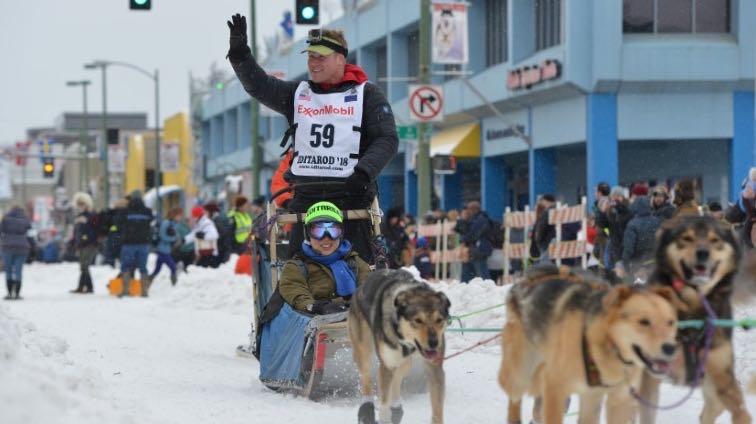Steve Watkins team during the ceremonial start of the Iditarod dog sled race in Anchorage, Alaska, March 3, 2018.
With light snow falling, spectators cheering and hundreds of dogs barking, sixty-seven mushers and their teams took off for a ceremonial 11-mile jaunt through Alaska's biggest city as the 46th Iditarod Trail Sled Dog Race began Saturday in Anchorage.
Timed competition in the race, which drew controversy after a champion musher's dogs tested positive for opioids last year, will start on Sunday in Willow, about 80 miles north of Anchorage, and teams will head out from there on the nearly 1,000-mile trek to Nome.
"Those are some race-hardened teams and they're going to put on an incredible race," musher Ramey Smyth said admiringly of the contenders, including three-time champion Mitch Seavey and his dogs, as he prepared to hitch up his own team Saturday.
Mushers were anticipating good trail conditions for the contest, which can last a week to 10 days. Late-winter storms brought plenty of snow, and the Iditarod is able to use its traditional route after several years of alterations forced by warm-weather-related snow shortages.
But the storied race faces some difficulty this year.
With oil-dependent Alaska experiencing an economic strain, the race has lost some financial backing. The winners' purse of $500,000 is down sharply from the nearly $750,000 paid out last year.
Animal-rights activists, long critical of the Iditarod, have also stepped up protests, citing the doping scandal as well as other mistreatment of dogs. Race organizers blame protesters for the loss of at least one large sponsorship.
On Saturday, protesters set up five mock graves to commemorate Iditarod dogs that died during last year's race or immediately afterward. They hoisted signs that accused the mushers of cruelty.
"This is not this nice pretty little race," said Canadian filmmaker Fern Levitt, director of a documentary critical of the Iditarod.
The start of the race on Saturday drew hundreds of celebrants, who packed the sidewalks. Fans petted mushers' dogs and musher assistants — called handlers — sported matching team jackets. Politicians including US Sen. Lisa Murkowski mingled with the crowd.
Many wore costumes. Musher Dee Dee Jonrowe, 65, a top racer who plans to retire after this year, was decked out in her trademark pink. Her truck is pink as are the booties and leashes worn by her dogs.
Jeanne Troshynski, a teacher who wore a long pink dress over rubber boots, defended the race.
"I think the majority of the people who run it have great integrity and love their dogs and do the best for their dogs," she said.
(Reporting by Yereth Rosen; editing by Sharon Bernstein and G Crosse)
The story you just read is accessible and free to all because thousands of listeners and readers contribute to our nonprofit newsroom. We go deep to bring you the human-centered international reporting that you know you can trust. To do this work and to do it well, we rely on the support of our listeners. If you appreciated our coverage this year, if there was a story that made you pause or a song that moved you, would you consider making a gift to sustain our work through 2024 and beyond?
